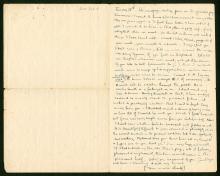BRACERS Record Detail for 19334
To access the original letter, email the Russell Archives.
"Tuesday" "The newspaper today gave me the greatest joy." This letter is written on the verso of document 200306.
There are two transcriptions of this letter: document .052410, record 99872; document 201115, record 116238; with annotations.
There is also a literary version: document .052388, no. 41, record 99853.
Two sentences were published in After Ten Years.
Letter 28
BR TO CONSTANCE MALLESON, 25 [JUNE 1918]
BRACERS 19334. AL. McMaster
Previous Brixton letter, BRACERS 46921; next letter, BRACERS 19317
Edited by K. Blackwell, A. Bone, N. Griffin and S. Turcon
<Brixton Prison>1
Tuesday 25th.
The newspaper today2 gave me the greatest joy. Tomorrow! I count the hours till these moments come,3 and then they are gone again and I feel how little I have asked of all I wanted to hear. — This plan is quite safe, if only adopted when we meet4 — so do let me know all sorts of things I lose touch with — about Miles, Marie,5 prospects of your work, your moods and interests. I was glad you liked War and Peace.6 Tell me more about the man who sang Figaro,7 if you feel so disposed. I shall use this plan whenever we meet, not at other times. If you like to bid farewell to G.J.8 there is no real need now to keep up his acquaintance unless some sudden crisis were to occur. I want C.A. (no one else unless Gladys)a to know I shall adopt H.S.9 if necessary — it should not be written through the post. He is coming South in a fortnight or so. I don’t want my brother to know. Having decided on that, I have entirely ceased to worry about the personal future — it makes it practically certain that I can’t be kept long away from you — I shouldn’t mind a time of being more or less ill if I could be with you. What I felt I could not face was being kept away from you indefinitely. Now I don’t care whether friends succeed with Geddes10 or not. It is dreadfully difficult to grow interested in philosophy while the world remains in its present condition but I am gradually succeeding. My dearest dear you know how all my thoughts and hopes are in you, don’t you? I am very happy underneath. If I had to divide my life, like Shaw’s plays,11 into 2 halves, pleasant and unpleasant, this time would come in the pleasant half — solely on account of you. Goodbye with love and blessing and all my heart.
[Two more sheets]12
- 1
[document] The letter was edited from the unsigned, single-sheet original in BR’s hand in the Malleson papers in the Russell Archives. It is written on the verso of the letter of 21 June 1918 (Letter 24).
- 2
newspaper today There was a Times Personal placed this day by Colette as “G.J.”: “So lonely. You have all my love” (BRACERS 96084).
- 3
till these moments come When he had visitors at the prison.
- 4
This plan is quite safe, if only adopted when we meet The plan of hiding letters in the uncut pages of books which would be exchanged during prison visits.
- 5
Marie Marie Blanche was an actress and friend of Colette’s. In a message as “C.O’N” in a letter from Gladys Rinder to BR, 21 June 1918 (BRACERS 116615), Colette wrote that Marie had been ill, had had an operation, was now in a nursing home and getting better. In Letter 22 BR, clearly assuming that the “illness” was a pregnancy, asked if the child Marie was going to have was Miles’s.
- 6
liked War and PeaceColette, in a message as “G.J.”, made reference to some of Tolstoy’s characters (letter from Rinder, BRACERS 79616).
- 7
the man who sang Figaro Frederick Ranalow (1873–1953), a baritone, was born in Dublin and studied at the Royal Academy of Music. In a message as G.J. in a letter from Frank and Elizabeth Russell, 6 June 1918 (BRACERS 46918), Colette wrote: “At Manchester I made friends with Ranalow, who sings Figaro.” Colette had written more expansively about Ranalow two days earlier in a letter she later designated “official”, which BR did not receive (BRACERS 113134). “On my way up to Manchester I found myself in the same railway carriage as Frederick Ranalow (nice though naive) who sings in Figaro for <Sir Thomas> Beecham.” Thus BR’s query in this letter. Again, a response was not forthcoming until Colette’s letter of 26 July 1918 (BRACERS 113145): “Ranalow. But I never saw him again; and had told you all there was to tell in a previous letter. On tour one runs into theatre people in that way, specially on Sunday trains.…”
- 8
G.J. Pseudonym used by Colette in letters and in The Times Personals. Now that they could smuggle letters in and out of prison, one of their previous means of communicating — through the Times Personals column — was abandoned.
- 9
H.S. Hunger strike.
- 10
friends succeed with Geddes I.e., in promoting the fellowship plan.
- 11
like Shaw’s plays Shaw’s plays had been collected and published as Plays: Pleasant and Unpleasant (2 vols., 1898).
- 12
[Two more sheets] These sheets are no longer with this letter and, even if extant, could not be editorially identified.
Textual Notes
- a
unless Gladys Inserted.

